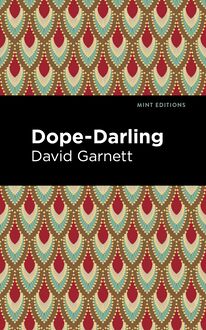-
 Univers
Univers
-
 Ebooks
Ebooks
-
 Livres audio
Livres audio
-
 Presse
Presse
-
 Podcasts
Podcasts
-
 BD
BD
-
 Documents
Documents
-
- Cours
- Révisions
- Ressources pédagogiques
- Sciences de l’éducation
- Manuels scolaires
- Langues
- Travaux de classe
- Annales de BEP
- Etudes supérieures
- Maternelle et primaire
- Fiches de lecture
- Orientation scolaire
- Méthodologie
- Corrigés de devoir
- Annales d’examens et concours
- Annales du bac
- Annales du brevet
- Rapports de stage
La lecture à portée de main
The Way Home , livre ebook
153
pages
English
Ebooks
2021
Écrit par
Henry Handel Richardson
Publié par
Mint Editions
Vous pourrez modifier la taille du texte de cet ouvrage
Obtenez un accès à la bibliothèque pour le consulter en ligne En savoir plus
Découvre YouScribe en t'inscrivant gratuitement
Découvre YouScribe en t'inscrivant gratuitement
153
pages
English
Ebook
2021
Vous pourrez modifier la taille du texte de cet ouvrage
Obtenez un accès à la bibliothèque pour le consulter en ligne En savoir plus
Publié par
Date de parution
28 septembre 2021
Nombre de lectures
0
EAN13
9781513293950
Langue
English
Poids de l'ouvrage
2 Mo
The Way Home (1925) is a novel by Henry Handel Richardson. Based on the life of her parents, The Way Home is the second in a trilogy of novels later published as The Fortunes of Richard Mahony (1930). The trilogy has earned praise from countless authors and critics for its startling depictions of a man’s decline due to mental illness and the lengths to which his wife must go to care for their young family. “In this pleasant spot Richard Mahony had made his home. Here, too, he had found the house of his dreams. It was built of stone—under a tangle of creeper—was very old, very solid: floors did not shake to your tread, and, shut within the four walls of a room, voices lost their carrying power. But its privacy was what he valued most.” After years of struggle in the Australian outback, Richard Mahony returns to his native England to live out his years in comfort and quiet. Although his dreams have been realized, he soon discovers the prejudice with which the wealthy view men who went across the world to make their fortunes. Unable to gain a foothold in the land of his birth, he makes the difficult decision to return to Australia. With a beautifully designed cover and professionally typeset manuscript, this edition of Henry Handel Richardson’s The Way Home is a classic of Australian literature reimagined for modern readers.
Publié par
Date de parution
28 septembre 2021
Nombre de lectures
0
EAN13
9781513293950
Langue
English
Poids de l'ouvrage
2 Mo
The Way Home
Henry Handel Richardson
The Way Home was first published in 1925.
This edition published by Mint Editions 2021.
ISBN 9781513291109 | E-ISBN 9781513293950
Published by Mint Editions®
minteditionbooks.com
Publishing Director: Jennifer Newens
Design & Production: Rachel Lopez Metzger
Project Manager: Micaela Clark
Typesetting: Westchester Publishing Services
C ONTENTS P ROEM P ART I I II III IV V VI VII VIII P ART II I II III IV V VI VII VIII IX P ART III I II III IV V VI VII VIII IX X
P ROEM
W hen, having braved the bergs and cyclones of the desolate South Pacific, and rounded the Horn; having lain becalmed in the Doldrums, bartered Cross for Plough, and snatched a glimpse of the Western Isles: when the homeward-bound vessel is come level with Finisterre and begins to skirt the Bay, those aboard her get the impression of passing at one stroke into home waters. Gone alike are polar blasts and perfumed or desert-dry breezes; gone opalescent dawns, orange-green sunsets, and nights when the very moon shines warm, the black mass of ocean sluggish as pitch. The region the homing wanderer now enters is quick with associations. These tumbling crested marbled seas, now slate-grey, now of a cold ultramarine, seem but the offings of those that wash his native shores; and they are peopled for him by the saltwater ghosts of his ancestors, the great navigators, who traced this road through the high seas on their voyages of adventure and discovery. The fair winds that belly the sails, or the head winds that thwart the vessel’s progress, are the romping south-west gales adrip with moisture, or the bleak north-easters which scour his island home and make it one of the windy corners of the world. Not a breath of balmy softness remains. There is a rawness in the air, a keener, saltier tang; the sad-coloured sky broods low, or is swept by scud that flies before the wind; trailing mists blot out the horizon. And these and other indelible memories beginning to pull at his heartstrings, it is over with his long patience. After tranquilly enduring the passage of some fifteen thousand watery miles, he now falls to chafing, and to telling off the days that still divide him from port and home.
On an autumn morning in the late ’sixties that smart clipper the Red Jacket , of some seven hundred tons burden, entered the English Channel, and having rolled about for a while, for want of a breeze to steady her, picked up a fine free following wind and forged ahead at a speed of eight and a half knots an hour.
At the eagerly awaited cry of “Land ho!” from the foretop, an excited bunch of cuddy-passengers and their ladies, all markedly colonial in dress and bearing, swarmed to the side of the vessel, and set to raking and probing the distance. Telescopes and spy-glasses travelled from hand to hand, arms were silhouetted, exclamations flew, the female gaze, adrift in space, was gallantly piloted to the sober level of the horizon. And even the most sceptical convinced that the dusky shadow on the water’s rim was, in truth, the goal of their journeying, three cheers were called for and given, the gentlemen swung their hats with an “England forever!” the ladies blew kisses and fluttered their kerchiefs. But, their feelings eased, they soon had their fill of staring at what might equally well have been a cloud or a trail of smoke; and having settled the wagers laid on this moment, and betted anew on the day and hour of casting anchor, they accepted the invitation of a colonial Croesus, and went below to drink a glass to the Old Country.
Richard Mahony alone remained, though warmly bidden.
“The pleasure of your company, Mr. Mahony, sir!”
“Mayn’t we hope, doctor, for a few words befitting the occasion?”
He had on the whole been a fairly popular member of the ship’s party. This was thanks to the do-nothing life. Here, on board ship, he had actually known what it was to feel time hang heavy on his hands. In consequence, he had come out of his shell, turned sociable and hearty, taking an interest in his fellow-travellers, a lead in the diversions of the voyage. And the golden weeks of sunshine and sea air having made a new man of him—in looks he resembled a younger brother of the lean and haggard individual who had climbed the ship’s ladder—he was able for once harmlessly to enjoy the passing hour. Again, a genuine sea-lover, he had found not one of the ninety odd days spent afloat unbearable; and in refusing to be daunted—either by the poor, rough food, or the close quarters; or during a hurricane, when the very cabins were awash; or again in the tropics, when the ship lay motionless on a glassy sea, the cruel sun straight overhead—by making light of inconvenience and discomfort, he had helped others, too, to put a brave face on them. Nobody guessed how easy it came to him. His cheerfulness was counted to him for a virtue, and set him high in general favour; people fell into the way of running to him not only with their ailments but their troubles; looked to him to smooth out the frictions that were the crop of this overlong voyage. So unusual a state of things could not last. And, indeed, with the vessel’s first knot in northern waters, he had become sensitively aware of a cooling-off. Let but a foot meet the shore, and the whole ill-mixed company would scatter to the winds, never to reassemble. Well, he, for one, would not feel that his ties with the colony were broken beyond repair until this had happened, and he had seen the last of all these boisterous, kindly, vulgar people.
The liking was chiefly on their part. For though, since setting sail, he had been rid of the big-mouthed colonial boaster, and among runaways like himself, men who were almost as glad as he to turn their backs on Australia—but a single one of the thirty cabin-passengers contemplated returning—this was far from saying that he had found in them congenial spirits. They chafed him in ways they did not dream of. The Midases of the party—it was ruled sharply off into those who had amassed a fortune and those who patently had not; none went “home” but for one or other reason; he himself was the only half tint on the palette—these lucky specimens were forever trumpeting the opinion that the colonies were a good enough place in which to fill your money-bags; but to empty them, you repaired to more civilised climes. And to hear his case—or at least what had once been his intention—put thus crudely made Mahony wince. The speakers reminded him of underbred guests, who start belittling their entertainment before they are fairly over their host’s door-sill. At the same time he had to laugh in his sleeve. For where, pray, could Monsieur le Boucher and Monsieur l’Epicier undo their purse-strings to better effect, find a society more exactly cut to their shape, than in the Antipodes, where no display was too showy, no banquet too sumptuous, no finery too loud; and where the man who could slap a well-filled pocket was anyone’s equal?—Even less to his taste was the group of lean kine. With nothing to show for themselves but broken health and shattered illusions, these men saw the land of their exile through the smoked glasses of hate, and had not a single good word to say for it. Which of course was nonsense.
And so it came about that Mary was sometimes agreeably surprised to hear Richard, if not exactly standing up for the colony, at least not helping to swell the choir of its detractors. This was unending, went round and round like a catch. People outdid one another in discovering fresh grounds for their aversion. Besides the common grievances—the droughts and floods, the dust winds and hot winds, the bare, ugly landscape, the seven plagues of winged and creeping things—many a small private grudge was owned to, and by the most unlikely lips. Here was a burly tanner who had missed the glimmer of twilight, been vexed at the sudden onrush of the dark. Another grumbler bemoaned the fact that, just when you looked for snow and holly-berries: “Hanged if there ain’t the pitches and appricoats ripe and ready to tumble into your mouth!”
“An onnatcheral country, and that’s the truth.”
“The wrong side of the world, say I—the under side.”
Quaint home-sicknesses cropped up, too. On board was a skinny little colonist from the Moreton Bay district, with, as the Irish wit of the company had it, “the face of his own granddad upon his shoulders”—who was, that is to say, more deeply wrinkled than the bewrinkled rest. Where this man came from, dirt was not: the little weatherboard houses were as clean when they dropped to pieces as when first run up. He it was who now confessed to an odd itch to see again the grime and squalor of London town: the shiny black mud that served as mortar to the paving-stones; the beds of slush into which, on a rainy day, the crossing-sweepers voluptuously plunged their brooms; the smoke-stained buildings; monuments tarred with the dirt of ages. He wanted to feel his cheek stung by the mixture of flying fodder and dry ordure that whirls the streets, does the east wind go; to sniff the heavy smell of soot and frost that greets the Londoner’s nose on a winter morning—even to choke and smother in a London fog.
No one smiled.
“Aye, it’s what one’s born to that tells; what one comes back to in the end,” nodded a pursy builder, whose gold watch-chain, hung with seals and coins, was draped across his waistcoat like a line of gala bunting. “I knew a man, gents—it’s a fact I’m tellin’ you!—who could ’a bought out the up-country township he lived in twice and three times over; and yet I’m blessed if this old Johnny-bono didn’t as good as turn on the waterworks when he spoke o’ the pokey old cottage down Devon way, where he’d been young. Seemed as if all the good smells o’ the rest o’ the world couldn’t make up to him for a bit o’ peat burnin’ on a still winter’s evenin’; or new thatch smellin’ in the rains or the softish stink o’ the milc

Ebooks
Dope-Darling
David Garnett


Ebooks
Australia Felix
Henry Handel Richardson


Ebooks
The Book of Life
Upton Sinclair


Ebooks
Ten Days in a Mad House
Nellie Bly


Ebooks
Married Love or Love in Marriage
Marie Stopes


Ebooks
As A Man Thinketh
James Allen


Ebooks
The Story of My Life
Helen Keller


Ebooks
The Way Home
Henry Handel Richardson

-
 Univers
Univers
-
 Ebooks
Ebooks
-
 Livres audio
Livres audio
-
 Presse
Presse
-
 Podcasts
Podcasts
-
 BD
BD
-
 Documents
Documents
-
Jeunesse
-
Littérature
-
Ressources professionnelles
-
Santé et bien-être
-
Savoirs
-
Education
-
Loisirs et hobbies
-
Art, musique et cinéma
-
Actualité et débat de société
-
Jeunesse
-
Littérature
-
Ressources professionnelles
-
Santé et bien-être
-
Savoirs
-
Education
-
Loisirs et hobbies
-
Art, musique et cinéma
-
Actualité et débat de société
-
Actualités
-
Lifestyle
-
Presse jeunesse
-
Presse professionnelle
-
Pratique
-
Presse sportive
-
Presse internationale
-
Culture & Médias
-
Action et Aventures
-
Science-fiction et Fantasy
-
Société
-
Jeunesse
-
Littérature
-
Ressources professionnelles
-
Santé et bien-être
-
Savoirs
-
Education
-
Loisirs et hobbies
-
Art, musique et cinéma
-
Actualité et débat de société
- Cours
- Révisions
- Ressources pédagogiques
- Sciences de l’éducation
- Manuels scolaires
- Langues
- Travaux de classe
- Annales de BEP
- Etudes supérieures
- Maternelle et primaire
- Fiches de lecture
- Orientation scolaire
- Méthodologie
- Corrigés de devoir
- Annales d’examens et concours
- Annales du bac
- Annales du brevet
- Rapports de stage





